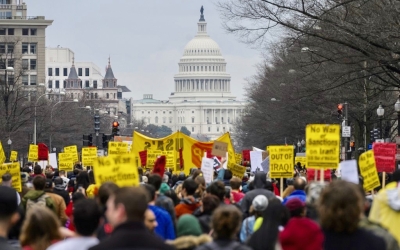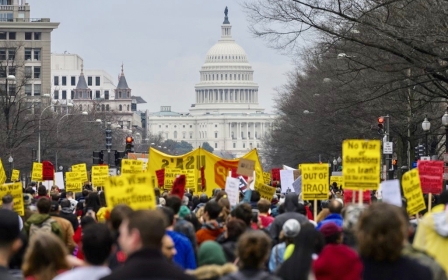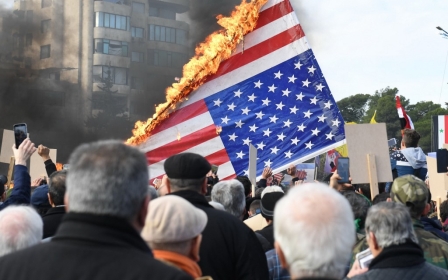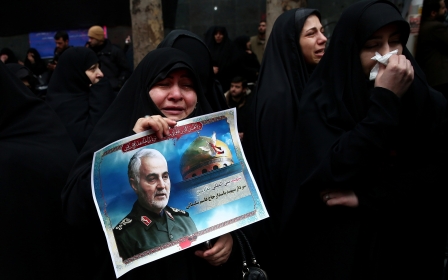Trump warns Tehran that US has 'targeted 52 Iranian sites'
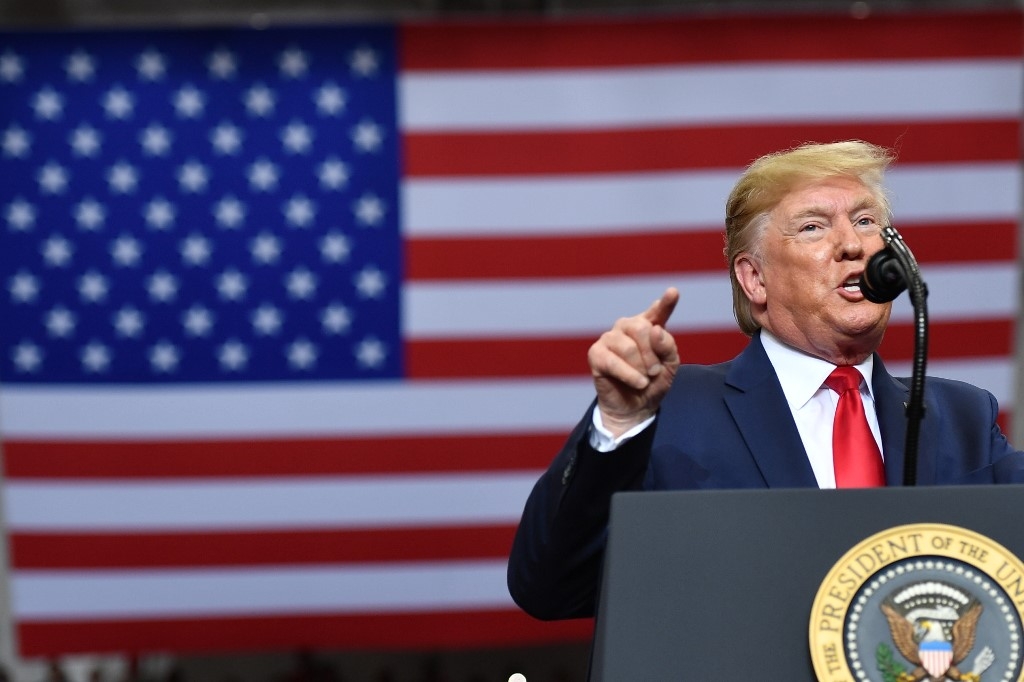
US President Donald Trump threatened that 52 "high level" Iranian targets "will be hit very fast" if Iran strikes Americans or American assets in retaliation for the killing of top general Qassem Soleimani on Friday.
"Iran is talking very boldly about targeting certain USA assets as revenge for our ridding the world of their terrorist leader," Trump wrote in a series of tweets referring to Soleimani on Saturday.
In an unusual pronouncement, the US president informed Iran of the number of targets that Washington has identified for potential retaliation against a possible Iranian attack.
"Let this serve as a WARNING that if Iran strikes any Americans, or American assets, we have targeted 52 Iranian sites (representing the 52 American hostages taken by Iran many years ago), some at a very high level & important to Iran & the Iranian culture, and those targets, and Iran itself, WILL BE HIT VERY FAST AND VERY HARD. The USA wants no more threats!"
Trump's remarks appear to be a response to an Iranian general who said earlier this week that his country has 35 US targets within its reach.
Iranian state television said Tehran had summoned the Swiss envoy, who represents US interests in Iran, to explain Trump's comments.
Iran's army chief said on Sunday that Washington lacked the "courage" to initiate a conflict following Trump's tweets.
"I doubt they have the courage to initiate [conflict]," Major General Abdolrahim Mousavi said, quoted by state news agency IRNA.
'Targeting cultural sites is a war crime'
Several Iranian officials had vowed to avenge Soleimani, with Supreme Leader Ali Khamenei pledging "severe revenge" against his killers, and Foreign Minister Mohammad Javad Zarif warning that the "end of US malign presence" in the region has begun.
It was unclear what Trump meant by referring to possible targets that are important to "Iranian culture", but international law prohibits military hostilities against cultural properties.
Home to the centre of the ancient Persian empire and some of the earliest cities and religions of human history, Iran has hundreds of cultural heritage sites.
Zarif tweeted: "Targeting cultural sites is a WAR CRIME," while Sina Toossi, a senior research analyst at the National Iranian American Council (NIAC), a Washington-based advocacy group, said Trump's comment is a "red alert for the international community".
The Republican president's tweets were issued during his holiday stay in Florida, Reuters noted. An increasing number of Democrats have said Trump's actions are bringing the United States to the brink of war.
The White House formally notified Congress of the strike on Saturday. Legislators received a classified memo, which a congressional aide described to Reuters as "brief and insufficient".
The Democratic Speaker of the House, Nancy Pelosi, was also unsatisfied with the notification.
"This document prompts serious and urgent questions about the timing, manner and justification of the Administration’s decision to engage in hostilities against Iran," Pelosi said in a statement.
She also decried Trump's "highly unusual" decision to classify the notification.
"The Trump Administration’s provocative, escalatory and disproportionate military engagement continues to put service members, diplomats and citizens of America and our allies in danger."
Americans protest against war
Anti-war protesters took to the streets of Washington and about 70 other US cities on Saturday and elsewhere to condemn Trump's actions.
Protesters demonstrated outside the White House, in New York's Times Square, at Trump Tower in Chicago and at the Brandenburg Gate in Berlin, among other locations.
The killing of Soleimani at Iraq's Baghdad airport follows months of intensifying tensions between Washington and Tehran provoked by Trump's decision to abandon a multinational nuclear deal with Iran last year and impose damaging economic sanctions.
The assassination came after protesters tried to storm the US embassy in Baghdad in response to US air strikes that killed 25 Iran-backed fighters from the Popular Mobilisation Units (PMU) in Iraq.
The American attack, in turn, came as retaliation for a rocket strike that killed a US contractor in Kirkuk, Iraq, some days earlier.
On Saturday, several rockets were launched near US military bases in Iraq, though no casualties were reported.
Earlier this week, the US military announced it was sending thousands of additional American troops to the Middle East.
Middle East Eye propose une couverture et une analyse indépendantes et incomparables du Moyen-Orient, de l’Afrique du Nord et d’autres régions du monde. Pour en savoir plus sur la reprise de ce contenu et les frais qui s’appliquent, veuillez remplir ce formulaire [en anglais]. Pour en savoir plus sur MEE, cliquez ici [en anglais].


